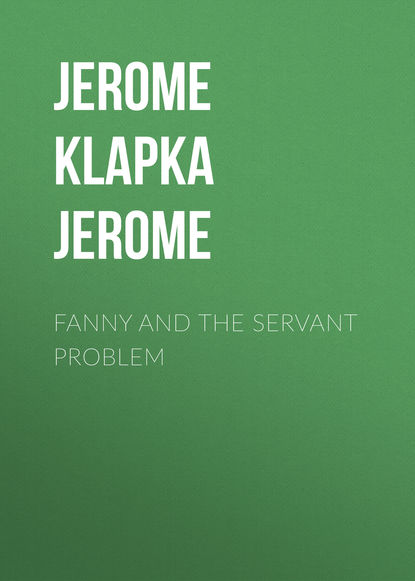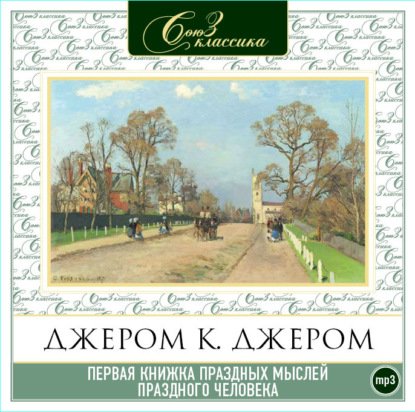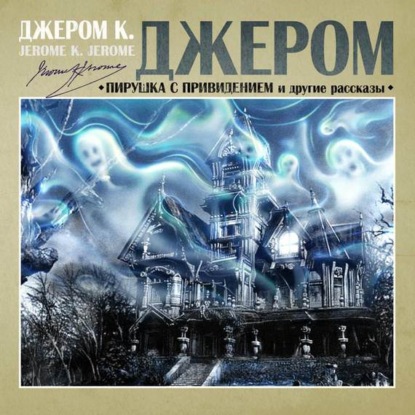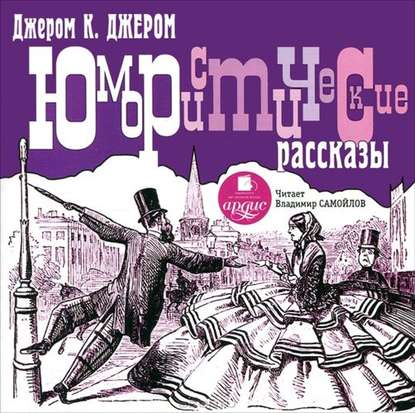 Полная версия
Полная версияПолная версия:
Джером Клапка Джером Fanny and the Servant Problem
- + Увеличить шрифт
- - Уменьшить шрифт

Jerome K. Jerome
Fanny and the Servant Problem
ACT I
SCENEThe Lady Bantock’s boudoir, Bantock Hall, Rutlandshire, a spacious room handsomely furnished (chiefly in the style of Louis the Fourteenth) and lighted by three high windows, facing the south-west. A door between the fireplace and the windows leads to his lordship’s apartments. A door the other side of the fireplace is the general entrance. The door opposite the windows leads through her ladyship’s dressing-room into her ladyship’s bedroom. Over the great fireplace hangs a full-length portrait of Constance, first Lady Bantock, by Hoppner.
The time is sunset of a day in early spring. The youthful Lord Bantock is expected home with his newly wedded wife this evening; and the two Misses Wetherell, his aunts, have been busy decorating the room with flowers, and are nearing the end of their labours. The two Misses Wetherell have grown so much alike it would be difficult for a stranger to tell one from the other; and to add to his confusion they have fallen into the habit of dressing much alike in a fashion of their own that went out long ago, while the hair of both is white, and even in their voices they have caught each other’s tones.
THE ELDER MISS WETHERELL [she has paused from her work and is looking out of the windows]. Such a lovely sunset, dear.
THE YOUNGER MISS WETHERELL [she leaves her work and joins her sister. The two stand holding each other’s hands, looking out]. Beautiful! [A silence. The sun is streaming full into the room.] You – you don’t think, dear, that this room – [she looks round it] – may possibly be a little too sunny to quite suit her?
THE ELDER MISS WETHERELL [not at first understanding]. How, dear, too sun – [She grasps the meaning.] You mean – you think that perhaps she does that sort of thing?
THE YOUNGER MISS WETHERELL. Well, dear, one is always given to understand that they do, women – ladies of her profession.
THE ELDER MISS WETHERELL. It seems to me so wicked: painting God’s work.
THE YOUNGER MISS WETHERELL. We mustn’t judge hardly, dear. Besides, dear, we don’t know yet that she does.
THE ELDER MISS WETHERELL. Perhaps she’s young, and hasn’t commenced it. I fancy it’s only the older ones that do it.
THE YOUNGER MISS WETHERELL. He didn’t mention her age, I remember.
THE ELDER MISS WETHERELL. No, dear, but I feel she’s young.
THE YOUNGER MISS WETHERELL. I do hope she is. We may be able to mould her.
THE ELDER MISS WETHERELL. We must be very sympathetic. One can accomplish so much with sympathy.
THE YOUNGER MISS WETHERELL. We must get to understand her. [A sudden thought.] Perhaps, dear, we may get to like her.
THE ELDER MISS WETHERELL [doubtful]. We might try, dear.
THE YOUNGER MISS WETHERELL. For Vernon’s sake. The poor boy seems so much in love with her. We must —
Bennet has entered. He is the butler.
BENNET. Doctor Freemantle. I have shown him into the library.
THE YOUNGER MISS WETHERELL. Thank you, Bennet. Will you please tell him that we shall be down in a few minutes? I must just finish these flowers. [She returns to the table.]
THE ELDER MISS WETHERELL. Why not ask him to come up here? We could consult him – about the room. He always knows everything.
THE YOUNGER MISS WETHERELL. A good idea. Please ask him, Bennet, if he would mind coming up to us here. [Bennet, who has been piling up fresh logs upon the fire, turns to go.] Oh, Bennet! You will remind Charles to put a footwarmer in the carriage!
BENNET. I will see to it myself. [He goes out.]
THE YOUNGER MISS WETHERELL. Thank you, Bennet. [To her sister] One’s feet are always so cold after a railway journey.
THE ELDER MISS WETHERELL. I’ve been told that, nowadays, they heat the carriages.
THE YOUNGER MISS WETHERELL. Ah, it is an age of luxury! I wish I knew which were her favourite flowers. It is so nice to be greeted by one’s favourite flowers.
THE ELDER MISS WETHERELL. I feel sure she loves lilies.
THE YOUNGER MISS WETHERELL. And they are so appropriate to a bride. So —
Announced by Bennet, Dr. Freemantle bustles in. He is a dapper little man, clean-shaven, with quick brisk ways.
DR. FREEMANTLE [he shakes hands]. Well, and how are we this afternoon? [He feels the pulse of the Younger Miss Wetherell] Steadier. Much steadier! [of the Elder Miss Wetherell.] Nervous tension greatly relieved.
THE YOUNGER MISS WETHERELL. She has been sleeping much better.
DR. FREEMANTLE [he pats the hand of the Elder Miss Wetherell]. Excellent! Excellent!
THE ELDER MISS WETHERELL. She ate a good breakfast this morning.
DR. FREEMANTLE [he pats the hand of the Younger Miss Wetherell]. Couldn’t have a better sign. [He smiles from one to the other.] Brain disturbance, caused by futile opposition to the inevitable, evidently abating. One page Marcus Aurelius every morning before breakfast. “Adapt thyself,” says Marcus Aurelius, “to the things with which thy lot has been cast. Whatever happens – ”
THE YOUNGER MISS WETHERELL. You see, doctor, it was all so sudden.
DR. FREEMANTLE. The unexpected! It has a way of taking us by surprise – bowling us over – completely. Till we pull ourselves together. Make the best of what can’t be helped – like brave, sweet gentlewomen. [He presses their hands. They are both wiping away a tear.] When do you expect them?
THE ELDER MISS WETHERELL. To-night, by the half-past eight train. We had a telegram this morning from Dover.
DR. FREEMANTLE. Um! and this is to be her room? [He takes it in.] The noble and renowned Constance, friend and confidant of the elder Pitt, maker of history, first Lady Bantock – by Hoppner – always there to keep an eye on her, remind her of the family traditions. Brilliant idea, brilliant! [They are both smiling with pleasure.]
THE ELDER MISS WETHERELL. And you don’t think – it is what we wanted to ask you – that there is any fear of her finding it a little trying – the light? You see, this is an exceptionally sunny room.
THE YOUNGER MISS WETHERELL. And these actresses – if all one hears is true —
The dying sun is throwing his last beams across the room.
DR. FREEMANTLE. Which, thank God, it isn’t. [He seats himself in a large easy-chair. The two ladies sit side by side on a settee.] I’ll tell you just exactly what you’ve got to expect. A lady – a few years older than the boy himself, but still young. Exquisite figure; dressed – perhaps a trifle too regardless of expense. Hair – maybe just a shade too golden. All that can be altered. Features – piquant, with expressive eyes, the use of which she probably understands, and an almost permanent smile, displaying an admirably preserved and remarkably even set of teeth. But, above all, clever. That’s our sheet-anchor. The woman’s clever. She will know how to adapt herself to her new position.
THE YOUNGER MISS WETHERELL [turning to her sister]. Yes, she must be clever to have obtained the position that she has. [To the Doctor] Vernon says that she was quite the chief attraction all this winter, in Paris.
THE ELDER MISS WETHERELL. And the French public is so critical.
DR. FREEMANTLE [drily]. Um! I was thinking rather of her cleverness in “landing” poor Vernon. The lad’s not a fool.
THE ELDER MISS WETHERELL. We must do her justice. I think she was really in love with him.
DR. FREEMANTLE [still more drily]. Very possibly. Most café-chantant singers, I take it, would be – with an English lord. [He laughs.]
THE ELDER MISS WETHERELL. You see, she didn’t know he was a lord.
DR. FREEMANTLE. Didn’t know – ?
THE YOUNGER MISS WETHERELL. No. She married him, thinking him to be a plain Mr. Wetherell, an artist.
DR. FREEMANTLE. Where d’ye get all that from?
THE ELDER MISS WETHERELL. From Vernon himself. You’ve got his last letter, dear. [She has opened her chatelaine bag.] Oh, no, I’ve got it myself.
THE YOUNGER MISS WETHERELL. He’s not going to break it to her till they reach here this evening.
THE ELDER MISS WETHERELL [she reads]. Yes. “I shall not break it to her before we reach home. We were married quietly at the Hôtel de Ville, and she has no idea I am anything else than plain Vernon James Wetherell, a fellow-countryman of her own, and a fellow-artist. The dear creature has never even inquired whether I am rich or poor.” I like her for that.
DR. FREEMANTLE. You mean to tell me – [He jumps up. With his hands in his jacket pockets, he walks to and fro.] I suppose it’s possible.
THE ELDER MISS WETHERELL. You see, she isn’t the ordinary class of music-hall singer.
DR. FREEMANTLE. I should say not.
THE ELDER MISS WETHERELL. She comes of quite a good family.
THE YOUNGER MISS WETHERELL. Her uncle was a bishop.
DR. FREEMANTLE. Bishop? Of where?
THE ELDER MISS WETHERELL [with the letter]. He says he can’t spell it. It’s somewhere in New Zealand.
DR. FREEMANTLE. Do they have bishops over there?
THE YOUNGER MISS WETHERELL. Well, evidently.
THE ELDER MISS WETHERELL. Then her cousin is a judge.
DR. FREEMANTLE. In New Zealand?
THE ELDER MISS WETHERELL [again referring to the letter]. No – in Ohio.
DR. FREEMANTLE. Seems to have been a somewhat scattered family.
THE YOUNGER MISS WETHERELL. People go about so much nowadays.
Mrs. Bennet has entered. She is the housekeeper.
MRS. BENNET [she is about to speak to the Misses Wetherell; sees the Doctor]. Good afternoon, doctor.
DR. FREEMANTLE. Afternoon, Mrs. Bennet.
MRS. BENNET [she turns to the Misses Wetherell, her watch in her hand]. I was thinking of having the fire lighted in her ladyship’s bedroom. It is half past six.
THE ELDER MISS WETHERELL. You are always so thoughtful. She may be tired.
MRS. BENNET. If so, everything will be quite ready. [She goes out, closing door.]
DR. FREEMANTLE. What do they think about it all – the Bennets? You have told them?
THE YOUNGER MISS WETHERELL. We thought it better. You see, one hardly regards them as servants. They have been in the family so long. Three generations of them.
THE ELDER MISS WETHERELL. Really, since our poor dear brother’s death, Bennet has been more like the head of the house than the butler.
THE YOUNGER MISS WETHERELL. Of course, he doesn’t say much.
THE ELDER MISS WETHERELL. It is her having been on the stage that they feel so.
THE YOUNGER MISS WETHERELL. You see, they have always been a religious family.
THE ELDER MISS WETHERELL. Do you know, I really think they feel it more than we do. I found Peggy crying about it yesterday, in the scullery.
DR. FREEMANTLE [he has been listening with a touch of amusement.] Peggy Bennet?
THE YOUNGER MISS WETHERELL. Yes. Charles Bennet’s daughter.
DR. FREEMANTLE. Happen to have a servant about the place who isn’t a Bennet?
THE YOUNGER MISS WETHERELL. No, no, I don’t really think we have. Oh, yes – that new girl Mrs. Bennet engaged last week for the dairy. What is her name?
THE ELDER MISS WETHERELL. Arnold.
THE YOUNGER MISS WETHERELL. Ah, yes, Arnold.
DR. FREEMANTLE. Ah!
THE ELDER MISS WETHERELL. I think she’s a cousin, dear.
THE YOUNGER MISS WETHERELL. Only a second cousin.
DR. FREEMANTLE. Um! Well I should tell the whole family to buck up. Seems to me, from what you tell me, that their master is bringing them home a treasure. [He shakes hands briskly with the ladies.] May look in again to-morrow. Don’t forget – one page Marcus Aurelius before breakfast – in case of need. [He goes out.]
The sun has sunk. The light is twilight.
THE ELDER MISS WETHERELL. He always cheers one up.
THE YOUNGER MISS WETHERELL. He’s so alive. [Mrs. Bennet comes in from the dressing-room. She leaves the door ajar. The sound of a hammer is heard. It ceases almost immediately.] Oh, Mrs. Bennet, we were going to ask you – who is to be her ladyship’s maid? Have you decided yet?
MRS. BENNET. I have come to the conclusion – looking at the thing from every point of view – that Jane would be the best selection.
THE YOUNGER MISS WETHERELL. Jane!
THE ELDER MISS WETHERELL. But does she understand the duties?
MRS. BENNET. A lady’s maid, being so much alone with her mistress, is bound to have a certain amount of influence. And Jane has exceptionally high principles.
THE YOUNGER MISS WETHERELL. That is true, dear.
MRS. BENNET. As regards the duties, she is very quick at learning anything new. Of course, at first —
The sound of hammering again comes from the bedroom.
THE YOUNGER MISS WETHERELL. Who is that hammering in her ladyship’s bedroom?
MRS. BENNET. It is Bennet, Miss Edith. We thought it might be helpful: a few texts, hung where they would always catch her ladyship’s eye. [She notices the look of doubt.] Nothing offensive. Mere general exhortations such as could be read by any lady. [The Misses Wetherell look at one another, but do not speak.] I take it, dinner will be at half past seven, as usual?
THE ELDER MISS WETHERELL. Yes, Mrs. Bennet, thank you. They will not be here till about nine. They will probably prefer a little supper to themselves.
Mrs. Bennet goes out – on her way to the kitchen. The Misses Wetherell look at one another again. The hammering recommences.
THE YOUNGER MISS WETHERELL [she hesitates a moment, then goes to the open door and calls]. Bennet – Bennet! [She returns and waits. Bennet comes in.] Oh, Bennet, your wife tells us you are putting up a few texts in her ladyship’s bedroom.
BENNET. It seemed to me that a silent voice, speaking to her, as it were, from the wall —
THE YOUNGER MISS WETHERELL. It is so good of you – only, you – you will be careful there is nothing she could regard as a personal allusion.
BENNET. Many of the most popular I was compelled to reject, purely for that reason.
THE ELDER MISS WETHERELL. We felt sure we could trust to your discretion.
THE YOUNGER MISS WETHERELL. You see, coming, as she does, from a good family —
BENNET. It is that – I speak merely for myself – that gives me hope of reclaiming her.
A silence. The two ladies, feeling a little helpless, again look at one another.
THE ELDER MISS WETHERELL. We must be very sympathetic.
THE YOUNGER MISS WETHERELL. And patient, Bennet.
BENNET. It is what I am preparing myself to be. Of course, if you think them inadvisable, I can take them down again.
THE YOUNGER MISS WETHERELL. No, Bennet, oh no! I should leave them up. Very thoughtful of you, indeed.
BENNET. It seemed to me one ought to leave no stone unturned. [He returns to his labours in the bedroom.]
THE YOUNGER MISS WETHERELL [after a pause]. I do hope she’ll like the Bennets.
THE ELDER MISS WETHERELL. I think she will – after a time, when she is used to them.
THE YOUNGER MISS WETHERELL. I am so anxious it should turn out well.
THE ELDER MISS WETHERELL. I feel sure she’s a good woman. Vernon would never have fallen in love with her if she hadn’t been good. [They take each other’s hand, and sit side by side, as before, upon the settee. The twilight has faded: only the faint firelight remains, surrounded by shadows.] Do you remember, when he was a little mite, how he loved to play with your hair? [The younger Miss Wetherell laughs.] I always envied you your hair.
THE YOUNGER MISS WETHERELL. He was so fond of us both. Do you remember when he was recovering from the measles, his crying for us to bath him instead of Mrs. Bennet? I have always reproached myself that we refused.
THE ELDER MISS WETHERELL. He was such a big boy for his age.
THE YOUNGER MISS WETHERELL. I think we might have stretched a point in a case of illness.
The room has grown very dark. The door has been softly opened; Vernon and Fanny have entered noiselessly. Fanny remains near the door hidden by a screen, Vernon has crept forward. At this point the two ladies become aware that somebody is in the room. They are alarmed.
THE ELDER MISS WETHERELL. Who’s there?
VERNON. It’s all right, aunt. It’s only I.
The two ladies have risen. They run forward, both take him in their arms.
THE YOUNGER MISS WETHERELL. Vernon!
THE ELDER MISS WETHERELL. My dear boy!
THE YOUNGER MISS WETHERELL. But we didn’t expect you —
THE ELDER MISS WETHERELL. And your wife, dear?
VERNON. She’s here!
THE ELDER MISS WETHERELL. Here?
Fanny, from behind the screen, laughs.
VERNON. We’ll have some light. [He whispers to them.] Not a word – haven’t told her yet. [Feeling his way to the wall, he turns on the electric light.]
Fanny is revealed, having slipped out from behind the screen. There is a pause. Vernon, standing near the fire, watches admiringly.
FANNY. Hope you are going to like me.
THE YOUNGER MISS WETHERELL. My dear, I am sure we shall.
THE ELDER MISS WETHERELL. It is so easy to love the young and pretty. [They have drawn close to her. They seem to hesitate.]
FANNY [laughs]. It doesn’t come off, does it, Vernon, dear? [Vernon laughs. The two ladies, laughing, kiss her.] I’m so glad you think I’m pretty. As a matter of fact, I’m not. There’s a certain charm about me, I admit. It deceives people.
THE YOUNGER MISS WETHERELL. We were afraid – you know, dear, boys – [she looks at Vernon and smiles] sometimes fall in love with women much older than themselves – especially women – [She grows confused. She takes the girl’s hand.] We are so relieved that you – that you are yourself, dear,
FANNY. You were quite right, dear. They are sweet. Which is which?
VERNON [laughs]. Upon my word, I never can tell.
THE YOUNGER MISS WETHERELL. Vernon! And you know I was always your favourite!
THE ELDER MISS WETHERELL. Dear!
VERNON. Then this is Aunt Alice.
THE YOUNGER MISS WETHERELL. No dear, Edith.
[Vernon throws up his hands in despair. They all laugh.]
FANNY. I think I shall dress you differently; put you in blue and you in pink. [She laughs.] Is this the drawing-room?
VERNON. Your room, dear.
FANNY. I like a room where one can stretch one’s legs. [She walks across it.] A little too much desk [referring to a massive brass-bound desk, facing the three windows].
THE ELDER MISS WETHERELL. It belonged to the elder Pitt.
FANNY. Um! Suppose we must find a corner for it somewhere. That’s a good picture.
THE YOUNGER MISS WETHERELL. It is by Hoppner.
FANNY. One of your artist friends?
VERNON. Well – you see, dear, that’s a portrait of my great-grandmother, painted from life.
FANNY [she whistles]. I am awfully ignorant on some topics. One good thing, I always was a quick study. Not a bad-looking woman.
THE ELDER MISS WETHERELL. We are very proud of her. She was the first —
VERNON [hastily]. We will have her history some other time.
THE YOUNGER MISS WETHERELL [who understands, signs to her sister]. Of course. She’s tired. We are forgetting everything. You will have some tea, won’t you, dear?
FANNY. No, thanks. We had tea in the train. [With the more or less helpful assistance of Vernon she divests herself of her outdoor garments.]
THE ELDER MISS WETHERELL [she holds up her hands in astonishment]. Tea in the train!
THE YOUNGER MISS WETHERELL. We were not expecting you so soon. You said in your telegram —
VERNON. Oh, it was raining in London. We thought we would come straight on – leave our shopping for another day.
FANNY. I believe you were glad it was raining. Saved you such a lot of money. Old Stingy!
THE ELDER MISS WETHERELL. Then did you walk from the station, dear?
FANNY. Didn’t it seem a long way? [She laughs up into his face.] He was so bored. [Vernon laughs.]
THE YOUNGER MISS WETHERELL. I had better tell – [She is going towards the bell.]
VERNON [he stops her]. Oh, let them alone. Plenty of time for all that fuss. [He puts them both gently side by side on the settee.] Sit down and talk. Haven’t I been clever? [He puts his arm round Fanny, laughing.] You thought I had made an ass of myself, didn’t you? Did you get all my letters?
THE YOUNGER MISS WETHERELL. I think so, dear.
FANNY [she is sitting in an easy-chair. Vernon seats himself on the arm]. Do you know I’ve never had a love-letter from you?
VERNON. You gave me no time. She met me a month ago, and married me last week.
FANNY. It was quick work. He came – he saw – I conquered! [Laughs.]
THE ELDER MISS WETHERELL. They say that love at first sight is often the most lasting.
VERNON [he puts his arm around her]. You are sure you will never regret having given up the stage? The excitement, the —
FANNY. The excitement! Do you know what an actress’s life always seemed to me like? Dancing on a tight-rope with everybody throwing stones at you. One soon gets tired of that sort of excitement. Oh, I was never in love with the stage. Had to do something for a living.
THE YOUNGER MISS WETHERELL. It must be a hard life for a woman.
THE ELDER MISS WETHERELL. Especially for anyone not brought up to it.
FANNY. You see, I had a good voice and what I suppose you might call a natural talent for acting. It seemed the easiest thing.
THE YOUNGER MISS WETHERELL. I suppose your family were very much opposed to it? [Vernon rises. He stands with his back to the fire.]
FANNY. My family? Hadn’t any!
THE ELDER MISS WETHERELL. No family?
Bennet enters. Vernon and Fanny left the door open. He halts, framed by the doorway.
FANNY. No. You see, I was an only child. My father and mother both died before I was fourteen.
THE YOUNGER MISS WETHERELL. But your uncle?
FANNY. Oh, him! It was to get away from him and all that crew that I went on the stage.
THE ELDER MISS WETHERELL. It is so sad when relations don’t get on together.
FANNY. Sadder still when they think they’ve got a right to trample on you, just because you happen to be an orphan and – I don’t want to talk about my relations. I want to forget them. I stood them for nearly six months. I don’t want to be reminded of them. I want to forget that they ever existed. I want to forget —
Bennet has come down very quietly. Fanny, from where he stands, is the only one who sees him. He stands looking at her, his features, as ever, immovable. At sight of him her eyes and mouth open wider and wider. The words die away from her tongue. Vernon has turned away to put a log on the fire, and so has not seen her expression – only hears her sudden silence. He looks up and sees Bennet.
VERNON. Ah, Bennet! [He advances, holding out his hand.] You quite well?
BENNET [shaking hands with him]. Quite well.




